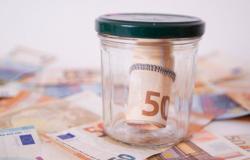The dollar weakened slightly on Monday but remained near its highest level in eight weeks, while the yen held near the 160 level, drawing verbal warnings from Japanese authorities, as fears of intervention grip the markets.
The yen weakened to 159.94 per dollar in early trade, its lowest level since April 29, when the yen hit a 34-year low of 160.245, leading Japanese authorities to spend around 9.8 trillion yen to support the currency.
The yen was slightly firmer at 159.75 per dollar after Masato Kanda, Japan’s top currency diplomat, said Monday that authorities would take appropriate action in the event of excessive currency movement, and that adding from Japan to the US Treasury watch list would not limit their actions.
“We will respond firmly to moves that are too rapid or driven by speculators,” Kanda said, although he clarified that authorities did not have specific levels in mind for when to intervene.
The yen came under further pressure after the Bank of Japan (BOJ) decided this month to wait until its July meeting to reduce its bond-buying program. It lost 1.5% in June.
“I no longer think that crossing the psychological level is enough (to intervene),” said Simon Harvey, head of foreign exchange analysis at Monex.
“The authorities told us they were more concerned about the rhythm and disorderly movements than individual levels.
A summary of views expressed at the BOJ’s June meeting showed that some policymakers called for a timely interest rate increase as they saw a risk of inflation expectations being exceeded.
The yen, which is very sensitive to US Treasury yields, has lost more than 10% against the dollar since the start of the year, due to the wide gap between interest rates in Japan and the United States. United.
Demand for carry trades, which involve borrowing yen at low rates to buy higher-yielding currencies, has also lifted the Australian and New Zealand dollars to 17-year highs against the yen.
THE INFLATION TEST IS ON THE HORIZON
This week, the spotlight will be on the US Personal Consumption Expenditures (PCE) Price Index – the Federal Reserve’s preferred measure of inflation – which is due to be released on Friday.
Economists polled by Reuters expect the index’s annual growth to slow to 2.6% in May. A weak reading is likely to strengthen bets on a rate cut as soon as September, which futures currently price as a 70% prospect, according to the CME’s FedWatch tool.
The dollar index, which measures the U.S. unit against six others, stood at 105.66, down from last week’s peak of 105.91.
There will also be a focus on geopolitics throughout the week, with the first US presidential debate on Thursday and the first round of the French elections at the end of the week.
“You will see a lot of defensive positions as we approach the first round of the French elections and the US presidential debate,” said Mr. Harvey of Monex.
“While a sense of calm weighs on the dollar this morning, political risk remains a decent source of strength for the dollar and we expect the dollar index to finish the week higher.”
The euro, which has been under pressure since French President Emmanuel Macron called a snap election earlier this month, was up 0.2% at $1.07125, but was still down 1.2% in June.
France’s far-right National Rally (RN) party and its allies are leading the first round of elections with 35.5% of the expected votes, according to an opinion poll published on Sunday.
RN MP Jean-Philippe Tanguy, who is widely seen as the most likely candidate to lead the finance ministry if the party wins and forms a government, told Reuters that an RN government would stick to the tax rules of the European Union.
Meanwhile, the yuan traded at 7.2609 per dollar, in a very narrow range and close to its lowest level in seven months, weighed down by the dollar’s overall strength and concerns about the weakness of the second largest largest economy in the world.






